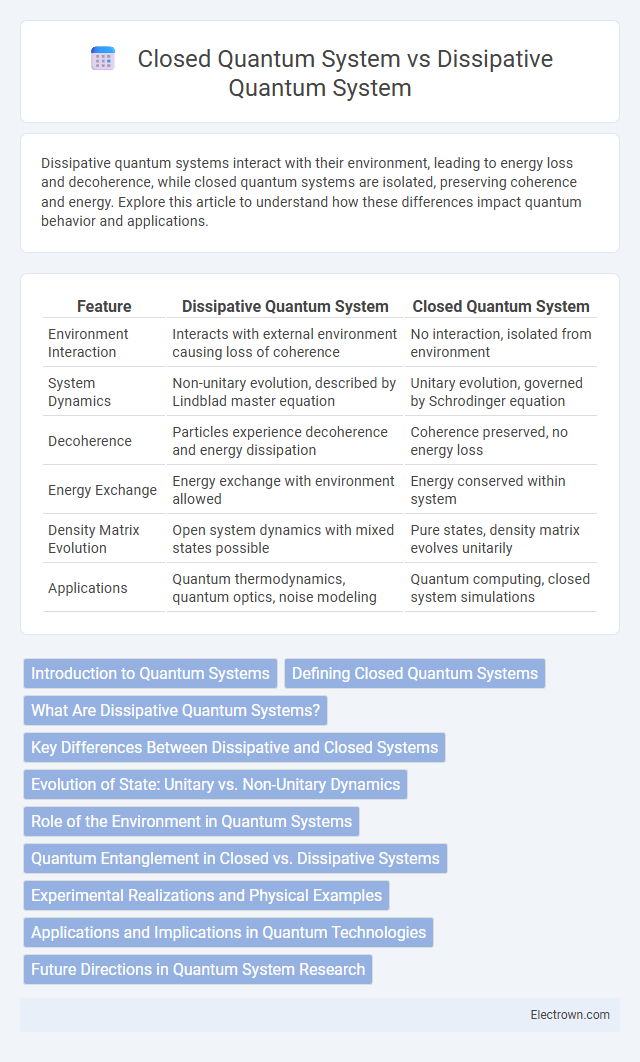Dissipative quantum systems interact with their environment, leading to energy loss and decoherence, while closed quantum systems are isolated, preserving coherence and energy. Explore this article to understand how these differences impact quantum behavior and applications.
Table of Comparison
| Feature | Dissipative Quantum System | Closed Quantum System |
|---|---|---|
| Environment Interaction | Interacts with external environment causing loss of coherence | No interaction, isolated from environment |
| System Dynamics | Non-unitary evolution, described by Lindblad master equation | Unitary evolution, governed by Schrodinger equation |
| Decoherence | Particles experience decoherence and energy dissipation | Coherence preserved, no energy loss |
| Energy Exchange | Energy exchange with environment allowed | Energy conserved within system |
| Density Matrix Evolution | Open system dynamics with mixed states possible | Pure states, density matrix evolves unitarily |
| Applications | Quantum thermodynamics, quantum optics, noise modeling | Quantum computing, closed system simulations |
Introduction to Quantum Systems
Quantum systems can be broadly classified into dissipative quantum systems and closed quantum systems based on their interaction with the environment. Closed quantum systems evolve unitarily, preserving quantum coherence and isolating the system from external noise, while dissipative quantum systems experience decoherence and energy exchange with their surroundings, leading to non-unitary evolution. Understanding these differences is crucial for accurately modeling quantum behavior and designing quantum technologies such as quantum computers and sensors.
Defining Closed Quantum Systems
Closed quantum systems are defined by their isolation from external environments, ensuring no exchange of energy or information with surroundings. This isolation preserves the system's pure quantum state and unitary evolution governed by the Schrodinger equation. Understanding these properties is essential for distinguishing closed systems from dissipative quantum systems, which interact with their environment causing decoherence and dissipation.
What Are Dissipative Quantum Systems?
Dissipative quantum systems interact with their environment, leading to energy loss and decoherence, unlike closed quantum systems that evolve in isolation with conserved energy. These systems are described by open quantum dynamics and master equations, capturing irreversible processes and quantum noise effects. Understanding dissipative quantum systems is crucial for quantum thermodynamics, quantum computing, and controlling entanglement in realistic settings.
Key Differences Between Dissipative and Closed Systems
Dissipative quantum systems interact with their environment, leading to energy loss and decoherence, whereas closed quantum systems are isolated and evolve unitarily without energy exchange. Your ability to model dissipative systems requires accounting for non-Hermitian dynamics and open system master equations like the Lindblad form. In contrast, closed systems follow the Schrodinger equation with time-reversible evolution, preserving quantum coherence throughout.
Evolution of State: Unitary vs. Non-Unitary Dynamics
A closed quantum system evolves through unitary dynamics, preserving the system's total probability and coherence as described by the Schrodinger equation. In contrast, a dissipative quantum system experiences non-unitary dynamics due to interactions with its environment, leading to decoherence and energy loss. Understanding these differences is crucial for controlling Your quantum state evolution in quantum computing and quantum information processing applications.
Role of the Environment in Quantum Systems
Dissipative quantum systems interact continuously with their surroundings, causing energy loss and decoherence that significantly alter quantum states, whereas closed quantum systems remain isolated and evolve purely under unitary dynamics without environmental influence. The environment acts as a crucial factor in dissipative systems, inducing noise and dissipation that lead to non-unitary evolution and the emergence of classical behavior from quantum phenomena. Understanding the role of the environment in your quantum system is essential for controlling decoherence and improving the stability of quantum information processing.
Quantum Entanglement in Closed vs. Dissipative Systems
Quantum entanglement in closed quantum systems remains robust due to unitary evolution under isolated conditions, preserving coherence and enabling reliable quantum information processing. In dissipative quantum systems, interaction with the environment leads to decoherence, causing entanglement decay and necessitating error correction or dissipation engineering for entanglement preservation. Understanding the dynamics of entanglement under non-Hermitian effects in dissipative regimes is crucial for developing quantum technologies resilient to environmental noise.
Experimental Realizations and Physical Examples
Dissipative quantum systems are experimentally realized using platforms such as superconducting qubits coupled to engineered reservoirs or trapped ions with controlled decay channels, enabling the study of non-unitary dynamics and decoherence. Closed quantum systems, in contrast, are often implemented in ultracold atomic gases or isolated photonic cavities, where unitary evolution dominates without energy exchange with the environment. Physical examples include dissipative Rydberg atom arrays exhibiting environment-induced state stabilization versus closed quantum spin chains undergoing coherent quantum phase transitions.
Applications and Implications in Quantum Technologies
Dissipative quantum systems leverage environment-induced interactions to enable error correction, quantum state stabilization, and robust quantum computing in noisy conditions, making them crucial for practical quantum technologies. Closed quantum systems, isolated from external perturbations, provide idealized models for quantum simulation and entanglement generation but face challenges in scalability and error resilience. The interplay between dissipative and closed systems drives advancements in quantum sensors, communication protocols, and fault-tolerant quantum computing architectures.
Future Directions in Quantum System Research
Future research in quantum systems increasingly focuses on dissipative quantum systems due to their ability to model realistic environmental interactions and decoherence effects, which are critical for developing robust quantum technologies. Investigations into engineered dissipation and error correction could advance quantum computing scalability, while studying closed quantum systems remains vital for understanding fundamental quantum mechanics and idealized quantum phenomena. Enhancing control over dissipative dynamics and exploring hybrid approaches between closed and open systems promise significant breakthroughs in quantum simulation and information processing.
dissipative quantum system vs closed quantum system Infographic

 electrown.com
electrown.com